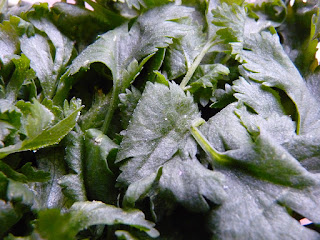 |
| Frozen strawberries: superb in porridge |
It should go without saying that all frozen fruit and veg are for further processing. They are not for defrosting and eating raw in salads. Most of them are best cooked straight from frozen, especially chips, which have to be cooked from frozen - otherwise you end up with a disgusting mush.
Our current favourites for freezing are:
- Berries
- Vegetables that don't need blanching such as tomatoes and chillies
- Peas and podded beans
- Blanched broccoli and cauliflower
- Herbs
- Par-fried chips
 |
| This week's candidates for tomato sauce |
 |
| Cheyenne and Cayenne |
I add them to small plastic containers as they reach their desired colour. Then I just use one at a time, straight from frozen.
Another item that uses little space is herbs. I only bother with two of them: coriander and parsley. They can be frozen as they come, no need to use ice cube trays or suspend in oil.
 |
| Coriander stocks |
In March I start to convert some of potatoes into frozen chips to bridge the gap in May and June when the old potatoes have run out or are getting a bit past it and the early potatoes aren't ready yet. You can just blanch the chips and then freeze. However, they tend to develop an oxidised edge, which doesn't look terribly appetising even if it doesn't affect the flavour. Par-frying avoids this.
Most other things I would now only freeze as part of a cooked dish, as a ready meal. Courgettes, especially, take on an odd rubbery texture when cooked from frozen. The same goes, to a slightly lesser extent, for green beans.
 |
| No need to freeze veg like chard that can be left in the ground over winter. |
Potatoes, onions and garlic are stored in sheds. Pumpkins and squashes are stored at room temperature in the kitchen and lounge, as they're also quite decorative. Apples are mainly dried as rings, which can be munched as a snack or rehydrated for baking or cooking. All other vegetables (carrots, courgettes, beetroot etc.) have been chopped into chutneys and pickles. Any remaining are used fresh and then we bid them farewell till next summer.
Hm, I remember frozen carrots. No problem...
ReplyDelete